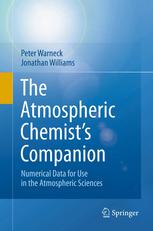

Most ebook files are in PDF format, so you can easily read them using various software such as Foxit Reader or directly on the Google Chrome browser.
Some ebook files are released by publishers in other formats such as .awz, .mobi, .epub, .fb2, etc. You may need to install specific software to read these formats on mobile/PC, such as Calibre.
Please read the tutorial at this link: https://ebookbell.com/faq
We offer FREE conversion to the popular formats you request; however, this may take some time. Therefore, right after payment, please email us, and we will try to provide the service as quickly as possible.
For some exceptional file formats or broken links (if any), please refrain from opening any disputes. Instead, email us first, and we will try to assist within a maximum of 6 hours.
EbookBell Team

4.1
90 reviewsThis companion provides a collection of frequently needed numerical data as a convenient desk-top or pocket reference for atmospheric scientists as well as a concise source of information for others interested in this matter. The material contained in this book was extracted from the recent and the past scientific literature; it covers essentially all aspects of atmospheric chemistry. The data are presented primarily in the form of annotated tables while any explanatory text is kept to a minimum. In this condensed form of presentation, the volume may serve also as a supplement to many textbooks used in teaching the subject at various universities.
Peter Warneck, a physical chemist specializing in atmospheric chemistry, received the diploma in 1954 and the doctorate in 1956 at the university in Bonn, Germany. In 1959, following several postdoctoral assignments, he joined the GCA Corporation in Bedford, Massachusetts, where he explored elementary processes in the atmospheres of the earth and other planets. He returned to Germany in 1970 to head the chemical kinetics group in the Air Chemistry Division of the Max-Planck-Institute for Chemistry in Mainz. In 1974 he also became professor of physical chemistry at the university in Mainz. In 1991, following German reunification, Warneck was appointed the founding director of the new Institute for Tropospheric Research in Leipzig. He served in this position parallel to his activities in Mainz until official retirement. Warneck’s research included laboratory studies of chemical mechanisms and photochemistry as well as the development of analytical techniques for field measurements. Since 1990, his interests are focused on chemical reactions in clouds.
Jonathan Williams is an atmospheric chemist. He received his BSc in Chemistry and French and his Ph.D. in Environmental Science from the University of East Anglia, England. Between 1995-1997 he worked as a postdoctoral researcher at the NOAA Aeronomy laboratory in Boulder, USA, and from 1998 to present as a member of staff at the Max Planck Institute for Chemistry, Mainz, Germany. He has participated in many international field measurement campaigns on aircraft, ships and at ground stations. Dr Williams is currently an editor on three atmospheric chemistry journals. His present research involves investigating the chemistry of reactive organic species in the atmosphere, in particular over forested ecosystems and in the marine boundary layer. Dr Williams leads a research group focussed specifically on Volatile Organic Compounds (VOC) at the Max Planck Institute and in 2008 he was made an honorary Reader at the University of East Anglia, UK.